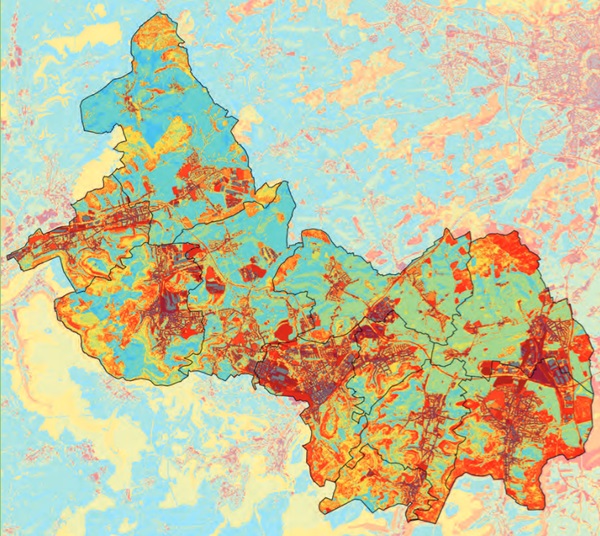
On Tuesday 22 October 2024, Claude Meisch, Luxembourg's Minister of Housing and Spatial Planning, together with Christian Weis, President of the Intercommunal Union PRO-SUD and Mayor of Esch-sur-Alzette, and Dr Jürgen Junk, Scientist in the Department of Environmental Research and Innovation of the Luxembourg Institute of Science and Technology (LIST), unveiled the results of the study "Stadtklimaanalyse für die Region PRO-SUD" (Urban climate analysis for the PRO-SUD region).
Carried out by GEO-NET of Hanover and LIST, this analysis of the urban bioclimate of the eleven municipalities that make up PRO-SUD draws up an inventory of the temperature of heat islands, shows the local consequences of climate change and proposes adaptation strategies to minimise the impact on residents.
Cities, especially densely built city centres, will be increasingly affected by heatwaves due to climate change. These urban heat waves occur during the summer months due to a low exchange of air masses and a high rate of waterproofing of surfaces in city centres. This leads to insufficient nocturnal cooling of built-up areas.
The bioclimatic study conducted in 2023/24 identified urban heat islands, cold air generation areas and cold air flows in the region on the scale of a 5x5m grid. The analysis covers the current situation and proposes projections for the period 2031-2060 based on IPCC RCP4.5 scenarios. In addition, the study provides recommendations for concrete actions for urban planning in order to reduce the impact of progressive climate change on the cities and villages of the Minett Unesco Biosphere.
During the presentation, Minister Meisch stressed "preparing the resilience of the territory is one of the guiding principles of the Master Programme of Spatial Planning [PDAT] and this study thus makes it possible to anticipate, react and adapt in the best possible way to maintain and strengthen the quality of life in the face of the effects of climate change. The study confirms again that the artificialisation of surfaces significantly increases heat disturbances within our cities. The fact that the study proposes a diverse catalogue of concrete measures to improve the thermal situation is an additional tool for the implementation of the approach chosen in the PDAT".
For Mayor Weis, the study "provides concrete courses of action to make the urban centres of the eleven municipal members of the Minett Unesco Biosphere more resilient to climate challenges, and also important information to preserve, or even improve, the cold air catchment areas and the corridors through which this natural cooling can flow to urbanised areas".
Jürgen Junk of LIST stressed "the catalogues of measures developed as part of the study are now available to urban planners, both public and private, to implement urban adaptations such as the creation of green and aquatic spaces, as well as fresh air circulation corridors. These developments aim to refresh urban spaces and mitigate the expected effects of climate change in the villages and cities of the PRO-SUD region".
PRO-SUD is a syndicate of regional municipalities that promote and develop Luxembourg's southern region. It is composed of eleven municipalities that together form the first Luxembourg biosphere reserve, the Minett Unesco Biosphere.
Detailed maps of the current situation (heat islands, cold air production areas and cold air circulation routes) in the eleven municipalities of the Minett Unesco Biosphere are freely accessible on www.geoportail.lu.








